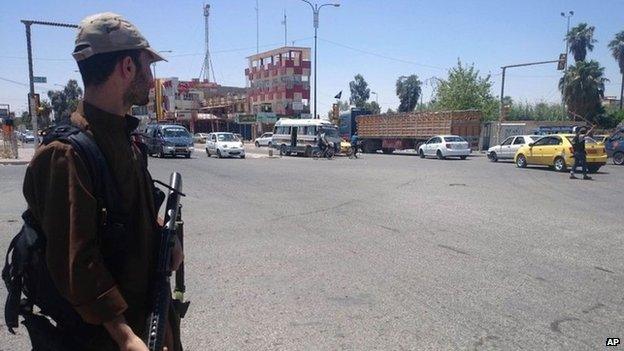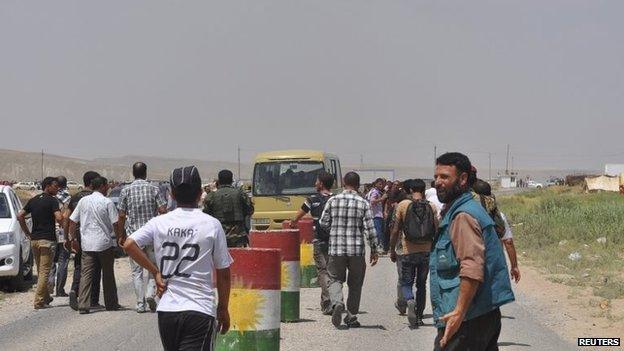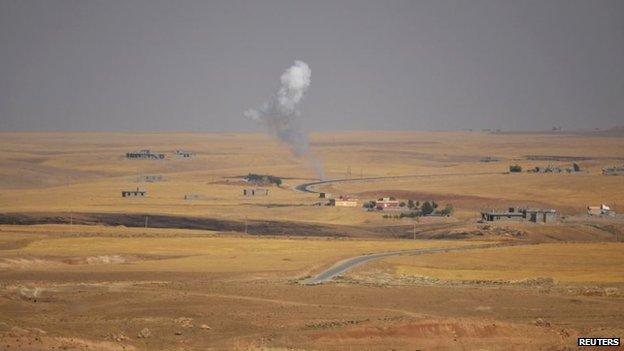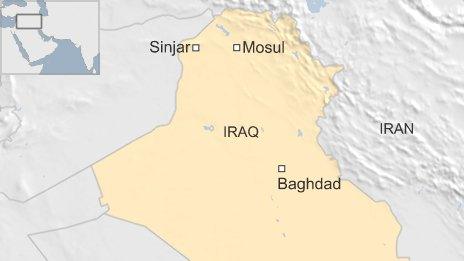Iraq crisis: Mosul air strike 'kills 60'
- Published

Iraqi government forces have been unable to dislodge Islamic State fighters from Iraq's second city
At least 60 people have been killed in an Iraqi air strike on a building under Sunni militant control in the northern city of Mosul, officials say.
Medical sources say it hit a prison run by the Islamic State (IS), a jihadist group that seized the city in June.
However, the military spokesman for the prime minister said an Islamic court formed by the jihadists was the target.
Elsewhere, a series of car bombs struck crowded markets in Shia districts of Baghdad, killing at least 47 people.
Twin blasts struck Sadr City on Wednesday evening killing at least 30 people, with another attack in Ur killing at least eight people. Attacks were also reported in eastern and southern districts of Baghdad.
The capital has become even more tense in recent weeks since Sunni jihadists threatened to attack it after seizing large areas of northern Iraq, says BBC Middle East analyst Sebastian Usher.
Thousands trapped
Kurdish forces, known as Peshmerga, were also reportedly shelling eastern districts of Mosul and an area to the north-east on Wednesday.
Iraqi state TV reported that the Mosul air strike had freed about 300 people held by the IS at the prison, which the group had reportedly been using as a religious court and detention centre.
Sources told the BBC that some of the detainees held by the group were among the dead, adding that a drone might have been used in the attack.

Thousands of Yazidis fled into the mountains near Sinjar after the Islamic State (IS) overran the town
Earlier, a senior Kurdish official warned that 50,000 members of the Yazidi religious minority trapped in mountains to the west faced death if they were not rescued soon.
The Yazidis fled there with few supplies after fighters from IS - previously known as the Islamic State in Iraq and the Levant (Isis) - overran the town of Sinjar at the weekend.
"Urgent international action is needed to save them. Many of them - mainly the elderly, children and pregnant women - have died," Jabbar Yawar, secretary-general of the Kurdistan Regional Government (KRG) ministry in charge of the Peshmerga, told the Reuters news agency.

Khalil, one of the thousands of Yazidis trapped on Mount Sinjar, told the BBC that their appeals for help were being ignored.
"We're hiding inside caves. We have nothing - no food and no water.
We've been under siege for four days. We eat once a day - either in the morning or at night.
We've managed to get some basic food supplies from neighbouring areas, but three children died today because of starvation. Seven women and children have died since yesterday because of dehydration.
A lot of the people here have disabilities or suffer from serious illnesses. It's 50C (120F) here and we're being bombarded indiscriminately.
We need help. Until now, no humanitarian aid has been delivered and no help provided by aid organisations - not the Red Cross or the Red Crescent, or even the United Nations. The Iraqi government and the Iraqi president have not helped. Nothing at all.

On Tuesday, the UN said it had received credible reports that 40 Yazidi children had died "as a direct consequence of violence, displacement and dehydration" since Sunday.
Government officials said 77 tonnes of food and water had been air-dropped in the area since Tuesday.

Kurdish Peshmerga fighters have launched a counter-offensive, Kurdish officials say
Sinjar fell during an offensive that saw the IS and its allies seize several other towns in the north-west, an oil field and Iraq's biggest dam, inflicting a humiliating defeat on the Peshmerga.
A senior official in Iraqi President Jalal Talabani's Patriotic Union of Kurdistan (PUK) said fighters from the Syria-based Kurdish Democratic Union Party (PYD) and the Turkish Kurdistan Workers' Party (PKK) had launched a counter-offensive.

"On our side, we are taking care of Zumar and the rest of the area north and east of Mosul," Hallo Penjweny told the AFP news agency.
Mr Yawar said Peshmerga fighters were also attacking IS positions in Makhmur, south-west of the Kurdistan Region's capital of Irbil, and that military co-operation with Baghdad had been re-established.
Ties were strained by the KRG's decision to send Peshmerga forces into disputed areas of northern Iraq in June after soldiers abandoned their posts in the face of the IS advance; a push by Kurdish leaders for an independence referendum; and Prime Minister Nouri Maliki's claim in July that they were giving sanctuary to extremists.
Kurds have also joined Sunni Arabs and some Shia in calling on Mr Maliki to step down because of his handling of the crisis, as well as what they say are the sectarian and authoritarian policies he has pursued.
But as the leader of the bloc that won the most seats in April's parliamentary elections, Mr Maliki has demanded the right to attempt to form a governing coalition.
In a televised address on Wednesday, he said any unconstitutional attempt to form a new government would "open the gates of hell".